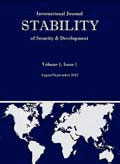 The inaugural issue of Stability, a new academic journal on international security and development, has launched, and its aim is to draw attention to new and emerging forms of instability and innovative responses. It also aims to tackle some of the major failures of contemporary academic publishing, including low real-world impact, unnecessary barriers to access, narrow marketing and distribution and, lastly, painfully slow publishing procedures that delay the dissemination of good ideas.
The inaugural issue of Stability, a new academic journal on international security and development, has launched, and its aim is to draw attention to new and emerging forms of instability and innovative responses. It also aims to tackle some of the major failures of contemporary academic publishing, including low real-world impact, unnecessary barriers to access, narrow marketing and distribution and, lastly, painfully slow publishing procedures that delay the dissemination of good ideas.
The journal challenges the tendency to view conflict, crime, and other forms of violence through separate lenses. Indeed, these artificial distinctions have in some cases masked the interconnections between contexts. The fact is that many ostensibly “post-conflict” and even “peaceful” settings register levels of insecurity that are on par with today’s war zones. These conceptual boundaries have unnecessarily constrained learning and cross-fertilization among scholars, policy makers, and practitioners.
The case of Mali highlights how multiple forms of insecurity are converging and forcing us to rethink how best to engage. There, al Qaeda-linked rebels in the north are financed in part by the transit of Latin American narcotics, mostly cocaine, into western Europe. Malian rebels are using drug wealth to recruit fighters, win local support with free services and delay an anticipated mission from the Economic Cooperation Organisation of West African States (ECOWAS). In Mali, we see European drug demand and Latin American narco-traffickers fueling an Islamist rebel movement, which is partly backed by Middle Eastern financiers and bolstered by Libyan and Sudanese fighters hardened through a succession of wars. International organizations, along with West African forces, are attempting to resolve the situation with mediation by Algeria.
The journal is endorsing a new approach to academic publishing. Part of its mission is to bring research to intended audiences in a faster and more accessible format. It hopes to chart a new path that is now referred to as “gold open access.” This means that articles are published online as soon as they are available (rather than waiting for the next opening in a future issue). Readers do not pay anything to access articles. And contributions are encouraged not only from professional researchers and academics but also from experienced policymakers and practitioners; authors from developing and violence-affected countries are pro-actively encouraged to contribute. Articles are then actively “marketed” to relevant policymakers and practitioners, both by the journal itself and by providing authors with information to guide them in disseminating their content.




